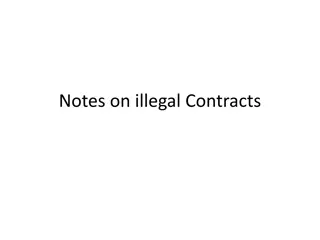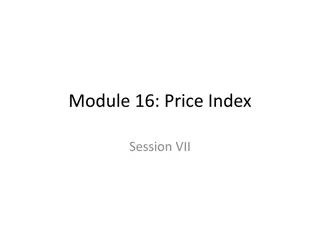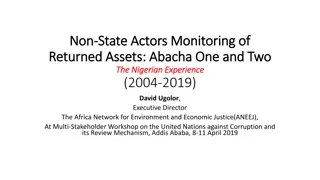Application of Price Adjustment in Civil Works Contracts: Lessons from Nigeria
The construction industry faces challenges due to price fluctuations in construction materials, especially in countries with unstable currencies. Civil works contracts funded by the World Bank are eligible for price adjustments if the contract duration exceeds 18 months. This presentation highlights the application of price adjustment in contract implementation, focusing on planning considerations for contracts executed in regions with significant price variations.
Download Presentation

Please find below an Image/Link to download the presentation.
The content on the website is provided AS IS for your information and personal use only. It may not be sold, licensed, or shared on other websites without obtaining consent from the author. Download presentation by click this link. If you encounter any issues during the download, it is possible that the publisher has removed the file from their server.
E N D
Presentation Transcript
Application of price adjustment in civil works contract funded by World Bank Lessons from Nigeria Uduak Akpan +2348064740389 | u.akpan@spidersolutionsnigeria.com SPIDER Solutions Nigeria Research | Data Lab | Project Management | Consultancy
Background The construction industry often faces challenges in terms of changes of prices of construction materials. This affects the completion of civil works contracts. This price fluctuations occur mainly in countries with unstable local currencies. In this regard, civil works contracts financed by credits from the World Bank are usually eligible for price adjustments if the duration of such contracts is over 18 months. In recent times, the World Bank had revised its standard bidding document for civil works contract, and had adopted the FIDIC conditions of contract as its general conditions of contract. The latest standard bidding document for civil works without prequalification may be found here. However, most contracts in Nigeria do not use the FIDIC conditions of contract. Therefore, engineers, procurement specialist, and other professionals in the construction industry seem not to understand the application of price adjustment in civil works contract. This presentation intends to shed some light on how price adjustment may be applied to contracts. Our focus in this presentation is on the application during contract implementation and not during the bidding process.
Planning for price adjustment Price adjustment is an important condition in a contract which are affects the execution of the contract, especially if the contract is executed in a country (such as Nigeria) where the prices of items fluctuate considerably. Hence there should be proper planning for it. The first step is to consider the provisions of the standard bidding document and FIDIC Conditions of Contract (2017 edition). In the standard bidding document, we note the following sections/subsections: Instruction to bidders -14.5, 15.1, 15.2. We also note the Appendix to Bid (Schedule of cost indexation, Table A, Table B, Table C) In the FIDIC Conditions of Contract (2017 edition), we note GCC13.7. In preparing the bidding document, the employer should change the entry in the bid data sheet (BDS) 14.5 of Request for Bids (RFB) to The prices quoted by the bidder shall be: Subject to price adjustment
Planning for price adjustment contd. Also, the employer should note that BDS15.1 has two options: Alternatives A and B. The employer should be careful when choosing any of the alternatives. In this presentation, we consider the case where the employer had chosen Alternative A. BDS15.2: We note that in BDS 15.1, the bidder is required to bid in local currency (i.e. Naira). Notwithstanding, the (successful) bidder is allowed to incur some cost in foreign currencies in the course of actual implementation of the contract. In this case, a successful bidder is expected to complete Table in the Appendix to bid and indicate the foreign currencies it wishes to incur the cost in (up to three foreign currencies), the proportion of the costs to be incurred in the foreign currencies, and a fixed exchange rate to be used in getting the foreign currency component.
Planning for price adjustment contd. We now consider the Appendix to Bid. We note that it is called Appendix to Bid because revisions can be made to this section after the bidding process is completed, before the contract is signed. There are four sub-sections in the section. Schedule of Cost Indexation: This is generally unchanged Table A. Local Currency: Parts of this is completed as shown below Table B. Foreign Currency (FC): This will be completed if the bidder will incur cost in foreign currency Table C. Summary of Payment Currencies: This will be completed if the bidder will incur cost in foreign currency
Planning for price adjustment contd. Table A Local Currency For large and/or complex civil works contracts, the BEME or BoQ should be organized into different families of works. Examples of families of works are presented below: Bridge: road construction leading to and away from the bridge; bridge. Drainage: Concrete works; bioremediation; flexible structures (gabions, reno-mattresses) The table for local currency (Table A) is completed for all families of works in the RFB. This is because it is not possible for the employer to know whether or not a successful bidder will incur cost in foreign currency at the time of preparing the RFB. An example of table of adjustment data for a large drainage project is presented in the next slide. Only to families of works are adjustable. The source of indices to be used should be generally acceptable and should have with low risk of manipulation The employer should pre-fill the column for Bidder s proposed weighting so as to guide the bidder on the acceptable range of values. The total weight completed by the bidder must sum up to 1.
Planning for price adjustment contd. Family of work - Concrete Index code* Index description* Source of index* Base value and date* Base value is the price of the item 28 days prior to bid opening Bidder s Bidder s proposed weighting A: 0.1 B: 0.1-0.3 C: 0.1-0.3 D: 0.1-0.3 E: 0.1-0.3 F: 0.1-0.3 1.00 related currency amount A B C D E F Nonadjustable Cement Steel reinforcement Gravel Labor Diesel FOCI FOCI FOCI NJIC NBS Total FOCI: Federal of Construction industry- Construction Materials distributors price index; NJIC: National Joint industrial Council Condition of service for junior employees in building and construction; NBS: National Bureau of Statistics Family of work - Gabions Index code* Index description* Source of index* Base value and date* Base value is the price of the item 28 days prior to bid opening Total Bidder s Bidder s proposed weighting A: 0.4 B: 0.1-0.2 C: 0.1-0.3 D: 0.1-0.3 1.00 related currency amount A B C D Nonadjustable Cement 300mm gabions Gabion baskets
BDS 15.1 Alternative A Include Appendix to Bid: (i) Schedule of Cost Indexation; (ii) Table A. Local Currency Contract will include - Appendix to Bid: (1) Schedule of Cost Indexation (2) Table A. Local Currency Did the successful bidder require foreign currency? Note: Requirement of foreign currency by a bidder does not affect the outcome of the evaluation process because the bid is submitted entirely in local currency No Yes (i) Successful bidder will be required to justify the foreign currency require as per ITB 15.2. (ii) Based on the justification in (i) above, Table C will be completed to show the proportions of foreign currencies that will be used as well as the exchange rate. The exchange rate is usually the official exchange rate on the day of bid opening (iii) Table B will be completed to reflect those families of works that will be incurred in foreign currency also to show that price adjustment will be applicable to the foreign currency component Contract will include Appendix to Bid: (i) Schedule of Cost Indexation; (ii) Table A. Local Currency; (iii)Table B. Foreign Currency (FC); (iv) Table C. Summary of Payment Currencies
Application of price adjustment Price adjustment may be applied to all interim payment certificates. Here we take cognizance of the provisions of FIDIC Conditions of (2017 edition) GCC13.7. GCC 13.7- Para 1: If Schedule(s) of cost indexation are not included in the Contract, this Sub-Clause shall not apply. GCC 13.7- Para 2: The amounts payable to the Contractor shall be adjusted for rises or falls in the cost of labour, Goods and other inputs to the Works, by the addition or deduction of the amounts calculated in accordance with the Schedule(s) of cost indexation. GCC 13.7- Para 3: To the extent that full compensation for any rise or fall in Costs is not covered by this Sub-Clause or other Clauses of these Conditions, the Accepted Contract Amount shall be deemed to have included amounts to cover the contingency of other rises and falls in costs. GCC 13.7- Para 4: The adjustment to be applied to the amount otherwise payable to the Contractor, as certified in Payment Certificates, shall be calculated for each of the currencies in which the Contract Price is payable. No adjustment shall be applied to work valued on the basis of Cost or current prices.
Application of price adjustment The following are definition of relevant currencies for guidance: Local currency: Nigerian Naira Currency of contract/currency in which the Contract price is expressed: Nigerian Naira Currency (ies) of payment: The currencies requested by the bidder as per ITB 15.1 in BDS and included in Table C of the Appendix to Bid. Currency of the country of origin of the indices
Scenario 1: The bidder will NOT incur any cost in foreign currency; country of origin of the indices is Nigeria.
(i) Calculate the indices for all the families of works independently using the formula in specified in Appendix to bid (schedule of cost indexation) Family of work - Concrete Current Value (include date - 49 days to date of IPC) Percentage B Base value (include date) Bidder's Proposed weighting Adjustment multiplier in local currency E= (B/A)*D = C*D Index description A C = B/A D Non-adjustable Tonne of cement Tonne of steel reinforcement Tonne of gravel Liter of diesel Labor 1 0.1 0.2 0.3 0.2 0.1 0.1 0.1 0.28 0.36 50,000.00 150,000.00 30,000.00 229.00 20,000.00 70,000.00 180,000.00 35,000.00 250.00 22,000.00 1.40 1.20 1.17 1.09 1.10 0.233333333 0.109170306 0.11 1.192503639 1 Family of work - Gabions Current Value (include date) Bidder's Proposed weighting Coefficient of adjustment in local currency E=C*D Index description Base value (include date) Percentage C = B/A A B D Nonadjustable Cement 300mm gabions (provide speficication) 1 0.1 0.2 0.1 0.28 50,000.00 70,000.00 1.40 300,000.00 310,000.00 1.03 0.35 0.361666667 Gabion baskets (provide specification) 30,000.00 32,000.00 1.07 0.35 0.373333333 1.1150 1
Scenario 1: The bidder will NOT incur any cost in foreign currency (ii) Apply the adjustment multiplier to the relevant family of work as shown in the BEME IPC Value Adjustment multiplier in local currency Prices adjustment Bill 1 - General Bill 2 - Concrete Bill 3 - Gabions Bill 4 - Grassing Bill 5 - Others TOTAL Not applicable Not applicable 3,850,072.78 2,300,000.00 Not applicable Not applicable 6,150,072.78 5,000,000.00 20,000,000.00 20,000,000.00 10,000,000.00 25,000,000.00 80,000,000.00 1.1925 1.1150 Not applicable Not applicable Summary IPC Value Price adjustment Amount due to contractor 80,000,000.00 6,150,072.78 86,150,072.78 Note that if the family of works is not included in Table A (local currency, then that family of works is not subject to price adjustment.
Scenario 2: (i) The bidder will incur some costs in foreign currency at a fixed exchange rate; (ii) country of origin of the indices is Nigeria. (iii) Table of Adjustment Data only in local currency - If the details of the cost to be incurred in foreign currency are not provided, one may assume that cost incurred in achieving the IPC is distributed in the proportions and currencies as specified in Table C. - In this case, it is unlikely that Table B will be included because Table B would have specified the families of work to be incurred in foreign currency
As an example, we use Nigerian Naira :40% and US$: 60%. The applicable exchange rate is US$1 = NGN400 (i) The standard practice is to calculate the adjustment multiplier for each currency for all the families of works using the formula in specified in Appendix to bid (schedule of cost indexation) as per GCC 13.7- Para 4 If Table B was not included, then price adjustment will not be applicable to the foreign currency component. When Table B (foreign currency) is not included all families of works are included in Table A (local currency). Table A captures changes in costs of items in local currency and is applied to only the cost incurred in local currency. If Table B is included, then the families of work to incurred in foreign currency will be included in Table B. In this case, the proportion of the families of work to be incurred in foreign currency included in Table B should be similar to the proportions included in Table C.
(i) Details of cost to be incurred in foreign currency not provided; (ii) However, there is a foreign currency payment; (iii) Table of adjustment data for all families of works are expressed local currency (Naira) - We use the adjustment multiplier computed previously IPC Value IPC Value incurred in local currency (40%) as per BDS 15.1 IPC Value incurred in Foreign currency (60%) as per BDS 15.1 Adjustment multiplier in local currency (applied to only local currency component Not applicable Adjusted amount in local currency Bill 1 - General Not applicable 5,000,000.00 2,000,000.00 3,000,000.00 Bill 2 - Concrete 20,000,000.00 8,000,000.00 12,000,000.00 1.1925 2,310,043.67 Bill 3 - Gabions 20,000,000.00 8,000,000.00 12,000,000.00 1.1150 1,380,000.00 Bill 4 - Grassing Not applicable Not applicable 10,000,000.00 4,000,000.00 6,000,000.00 Bill 5 - Others Not applicable Not applicable 25,000,000.00 10,000,000.00 15,000,000.00 TOTAL 80,000,000.00 32,000,000.00 48,000,000.00 3,690,043.67 Summary IPC Value IPC Value incurred in local currency IPC Value incurred in foreign currency Price adjustment in local currency Amount due to contractor - Naira Amount due to contractor - US$ (exchange rate is US$1=NGN400): foreign currency/400 80,000,000.00 32,000,000.00 48,000,000.00 3,690,043.67 35,690,043.67 $ 120,000.00
Scenario 3: (i) The bidder will incur some costs in foreign currency at a fixed exchange rate; (ii) country of origin of the indices is Nigeria. (iii) Table of Adjustment Data provided in local currency and foreign currency - If details of the cost to be incurred in foreign currency is provided (as per ITB15.2), such details will align the price adjustment will apply to the families of works that in the respective currencies (as per GCC 13.7- Para 4). Table A will be used for price adjustment in local currency while Table B will be used for price adjustment in foreign currency.
Example: the bidder specifies that it will incur the cost of gabions in foreign currency at an applicable exchange rate is US$1 = NGN400. Gabions constitute 40% of the total works component based on the bid submitted by the bidder. (i) Calculate the adjustment multiplier for each currency for all the families of works independently using the formula in specified in Appendix to bid (schedule of cost indexation) as per GCC 13.7- Para 4. Use Table A to calculate the multiplier for the local currency cost component and Table B for the foreign currency cost component. If Table B is included, then the families of work to incurred in foreign currency will be included in Table B. In this case, the proportion of the families of work to be incurred in foreign currency included in Table B should be similar to the proportions included in Table C.
(i) Calculate the indices for all the families of works independently using the formula in specified in Appendix to bid (schedule of cost indexation). Calculate for local and foreign currencies. Table of Adjustment Data (Local Currency, family of work - concrete) Coefficient of adjustment in local currency E=C*D Current Value (include date) Bidder's Proposed weighting D Index description Base value (include date) Percentage A B C = B/A Non-adjustable Tonne of cement Tonne of steel reinforcement Tonne of gravel Liter of diesel Labor 1 0.1 0.2 0.3 0.2 0.1 0.1 0.1 0.28 0.36 50,000.00 150,000.00 30,000.00 229.00 20,000.00 70,000.00 180,000.00 35,000.00 250.00 22,000.00 1.40 1.20 1.17 1.09 1.10 0.233333333 0.109170306 0.11 1 1.192503639 Table of Adjustment Data (Foreign Currency, family of work gabions) Base value (include date) date) A B Current Value (include Bidder's Proposed weighting Coefficient of adjustment in local currency E=C*D Index description Percentage C = B/A D Nonadjustable 1 0.1 0.10000 Cement 300mm gabions (provide speficication) Gabion baskets (provide specification) 100.00 110.00 1.10 0.2 0.22000 600.00 610.00 1.02 0.35 0.35583 60.00 62.00 1.03 0.35 0.36167 1.03750 1
(ii) Apply the adjustment multipliers in the different currencies to the relevant families of works incurred in the respective currencies as shown in the BEME IPC Value (measured works computed x unit rates in BEME) Bill 1 - General 5,000,000.00 Local Bill 2 - Concrete 20,000,000.00 Local Bill 3 - Gabions 20,000,000.00 Foreign 400.00 Bill 4 - Grassing 10,000,000.00 Local Bill 5 - Others 25,000,000.00 Local TOTAL 80,000,000.00 Currency Exchange rate IPC Value incurred in the different currencies 5,000,000.00 Not applicable 20,000,000.00 $ 50,000.00 10,000,000.00 Not applicable 25,000,000.00 Not applicable Adjustment multiplier in applicable currencies Adjusted amount in applicable currency Not applicable 1.1925 1.0375 3,850,072.78 $ 1,875.00 Not applicable Not applicable Summary IPC Value IPC Value incurred in local currency IPC Value incurred in foreign currency Price adjustment in local currency Price adjustment in Foreign currency Amount due to contractor - Naira Amount due to contractor - US$ (exchange rate is US$1=NGN400) 80,000,000.00 60,000,000.00 $ 50,000.00 3,850,072.78 1,875.00 63,850,072.78 $ 51,875.00
Conclusion Price adjustment is an important aspect of construction contracts when duration of contract is over 18months In these examples, we have not included any scenario where the currency of country of origin of the indices is different from the currency in which the Contract price is expressed. In such situations, a currency correction factor will be applied to obtain the coefficient of adjustment. Price adjustment should be applied in a manner consistent with the contract and should be fair to the employer and contractor.























